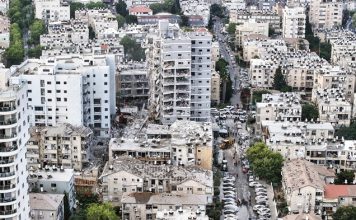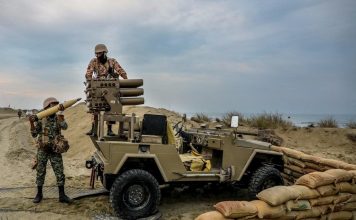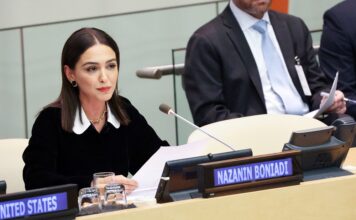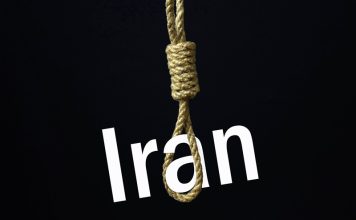By Kayhan Life Staff
On June 3, Crown Prince Reza Pahlavi held a press conference on recent developments in Iran in which he mentioned support for widespread protests against the Islamic Republic and the international community’s reaction to these events.
“The greatest opposition and alternative to the Islamic Republic is inside the country and is the people themselves,” Prince Reza said.
“Today, I can say with utmost confidence that I am not worried about the day after the Islamic Republic is gone, because I can see that despite the regime’s efforts to ban activities and impose restrictions on Iranians and young people, there are enough specialized workforce, managers, and experts to run the country,” Prince Reza argued.
“Those who worry about an alternative to the Islamic Republic do not think that there are people among a population of 85 million who can replace those who only deliver sermons from dawn to dusk? I am certain there are,” he added.
In its summer issue (issue 4), Fereydoon, a quarterly online magazine published by the U.S.-based National Union for Democracy of Iran (NUFDI), a “non-partisan, non-profit organization representing the Iranian-American community,” interviewed Crown Prince Reza about the developments in Iran.
شماره ۴ فصلنامه «فریدون» منتشر شد؛ در دفاع از ایرانگرایی
گفتگوی ویژه «فریدون» در شماره ۴ با شاهزاده رضا پهلوی است.
نسخه پیدیاف شماره ۴ «فریدون» را از اینجا دانلود کنید:https://t.co/aTEKbEAAA0
همه مطالب فصلنامه در وبسایت نشریه نیز قابل دسترس است:https://t.co/g0pFblfeUV pic.twitter.com/1cc5rUwsa9
— فصلنامۀ فریدون (@FereydounJRL) August 20, 2022
The following is the text of the interview by Fereydoon. The interview was conducted by Mohammad Izadi, Saeed Ghasemi-Nejad, and Alireza Kiani.
**********
Saeed Ghasemi-Nejad: Thank you for agreeing to sit for this interview. The political climate in Iran collapsed in December 2017. Slogans chanted by protesters show a wholesale rejection of the entire [ruling] system and the 1979 [Islamic Revolution] mindset.
However, groups that support the people have not abandoned the 1979 mindset altogether. What are your thoughts on the matter, and how do you view our society?
Crown Prince Reza Pahlavi: Let me share my impression of the political climate in the country with you. I have watched political events in the country for the past 40 years.
What is significant about the slogans shouted by protesters, including ‘Reza Shah, God bless your soul’ and ‘we made a mistake to start a revolution,’ is that they signal a change in the social discourse, showing that our society did not understand the evil intentions of [Ayatollah Ruhollah] Khomeini [founder of the Islamic Republic] then, but they do now.
Khomeini and his people were against modernism, development, and progress. The Western world is the principal model for growth and advancement. The [Islamic Republic] regime’s core identity revolves around its anti-western sentiment. Marxist forces, which opposed the West for their particular reasons, were initially allies of the regime. What is the state of the country after 40 years? Let’s put aside the past for now.
There was no internet and no satellites then. Iranian youth sees the world through the internet these days. They are a hundred times more informed about the world than pre-revolution Iranian youths. Young people in Iran crave the same freedom that their Canadian, Japanese, and Swedish counterparts enjoy.
Other issues that grip the country, including poverty, mismanagement, corruption, and water scarcity notwithstanding, freedom is the principal concern of the people. Iran’s ruling system has robbed our society of the opportunity to be free, grow, and prosper. We had that prospect before 1979 but lost it.
However, reflecting on history and pondering who we were and what we have done does not mean our young people must reverse time. We must lay the groundwork for future development and progress.
There were no civil institutions in the country when my grandfather took power. He established civil institutions that helped our society grow and to produce managers and technocrats.
Our society became political over several decades and challenged the state. Society plays a crucial role in a secular democratic governing system. Political forces are vital in a system where political and organizational management have equal importance.
In the post-Islamic Republic period, not only will we have to put our society on the right track towards progress, but we must also create better political management. Our present needs are in line with the achievements made before 1979. However, the main issue is how to compensate for the shortcomings of that period.
My message to our people is that we should not base our understanding on what happened in the past, but we must accept individual, organizational and political responsibility and take part in running the country on every level. Have we reached that point, and are we ready for it?
The reason that my June 3 statement has resonated with people is that I highlighted society’s role in standing up to the [Islamic Republic] regime, arguing that an opposition has to come from within our society. People must be directly involved in creating political groups and organizations. That is the only way for an organization to play an effective role in coordination and leadership.
A country’s political elite cannot form policies without considering society’s needs, as if it has no intellectual connection with people. What segment of political forces understands society’s demands and works towards achieving those goals? Society does not always choose the right path, as the events of 40 years ago showed. Political groups could not, for whatever reason, effectively manage the situation and failed to prevent society from walking toward the precipice.
Two crucial events have occurred recently. Society’s political demands have evolved into a national movement, as is clear of people’s growing support for each other. Protesters in cities shout the names of other cities. Also, reform is a dead issue now. Even reformist forces believe in regime change.
So, the call for regime change is no longer limited to people like me and secular democratic forces who have always believed that an Islamist totalitarian regime is not in our country’s best interest. We who have called for regime change can work with disillusioned reformists towards a common goal.
Except for a small group with close personal and financial ties to the regime or who fear punishment in a post-Islamic Republic period, no one else wants the current situation to continue. Most people would like to see a regime change in Iran.
The discussion is not about whether there should be a regime change but what happens in the post-Islamic Republic period and deciding what the alternative governing system will be like. How should it form, so the country will not experience a crisis?
To achieve the desired outcome, we must, naturally, devise systems for identifying individuals to assume major responsibilities, which is a crucial issue because no one wants the situation to deteriorate any further in the country. Society can feel reassured about the change if it believes that specialized forces, tangible solutions, technocracy, and political management are reliable enough to fill the vacuum.
Yes. The issue is not about going back in time, which is impossible, but about using the lessons learned and pondering the lasting effects of the achievements made in the period, which still resonate with the people even four decades after the 1979 catastrophe.
You mentioned the need to attract experts in your recent speech. Former Pahlavi monarchs’ pro-Iranism played a significant role in attracting experts. This view is vital when reviewing the rival camps, one of which is the Islamists, who do not view Iran as a homeland but as a tool to facilitate the advent of the 12th Imam.
Another rival camp is separatists who oppose Iran as a country and want to break it up. The third group is Marxist Cosmopolitanism, which differs from Social Democracy. What role did pro-Iranism play in that climate, and what role can it play in the future in rebuilding Iran?
For any school of thought, such as Pahlavism, to find a place in a society, it must first be studied and compared to other ideas in an open political and media environment. As you said, only in an open political climate can people analyze the difference between Marxist Cosmopolitanism and Social Democracy; the latter promotes people-government. Media in the pre-revolution did not explore such a comparison.
The impression was that security agencies were in control and freedom of speech did not exist. However, most people in SAVAK [Pahlavi era security police] prisons said they could express their thoughts after release.
Organizational management had developed in the country before the revolution, and the technocracy was not the product of political fights but followed orders that came from high up. Such a situation would naturally run into difficulty.
In world democracies, no single person is responsible for problems resulting from endemic battles between political parties. So, if we entrust the entire system to one person, they will be held accountable for anything that goes wrong, irrespective of how well-intentioned and capable they may be.
I need to stress the difference between going back and reviewing the past. I reject the former and support the latter. We must move from one-person rule to a system-based government in which many people can play significant roles. There should always be room for criticism, where civil institutions play a crucial role.
The pyramid management model does not help society to grow. A government should be based on meritocracy and not controlled by a select group of people who censor the facts. There should be an independent judiciary, and people should not be afraid to air their grievances.
The most crucial issue is that the government must be compassionate and address people’s concerns. The government must serve the people and not the other way around.
The practical experiences and lessons we have learned in the past 100 years since the Constitutional [Revolution] must help us not make past mistakes. We will undoubtedly make mistakes, but hopefully, they will be new ones and not repeat old ones.
A society must operate within a decision-making mechanism. The only way to cease making mistakes is to have dialogues in an open climate and for the entire nation to accept responsibility. Collective responsibility is a must for the future of our country, which would mark a distinct change from the past.
Q: Naturally, when we speak about the future of Iran, we assume we will resolve all political disputes in a democratic environment. One criticism leveled against experts, and some people is that in 1979 they did not choose those whose principal aim was to serve Iran.
Do you think various political groups can unify around pro-Iranism? Iran is not a priority for some groups, including Islamists, secessionists, and Cosmopolitanism (on the left or right).
We must discuss every idea. The main issue is society. Will a better-informed public than the one 57 years ago accept ideas that oppose pro-Iranism? Would the public support secessionists or cosmopolitanism? Experience has shown that societies that favor political pluralism shun extremism. A system that protects people’s interests marginalizes those who oppose pro-Iranism.
Alireza Kiani: Secessionists fade away under a national government and in normal conditions. However, some of the separatist sentiments are projects and have nothing to do with the conditions in the country. There were people in the Pahlavi era who advanced foreign governments’ agendas.
In a meeting between you and several of Fereydoon’s writers and others, you said there was no difference between a secessionist and Saddam Hussein’s soldier. Undoubtedly, the secessionist you spoke of differs from an indoctrinated person in Iran who expresses their opinion. The emphasis here is on people who advance the agenda of foreign governments.
I cannot conceive of a country that can tolerate forces working for foreign powers inside its territory. During World War II, France never forgave those in the country who collaborated with Hitler. What does that mean? No one can accept an organization with links to a foreign government. The issue is not open for discussion.
Those who operate as agents of foreign governments differ from those who do not behave the same way. We must persuade them by explaining the negative impacts of having links to foreign governments. Otherwise, we must clarify our position to those who want to be lackeys of a foreign government.
OPINION: Why Prince Reza Pahlavi Represents Hope for Many Young Iranians
Q: I have another question about Mohammad Reza Shah, who held personal Islamic beliefs while protecting Iranian national interests. He did not sacrifice the country in favor of Islamic and Palestinian interests. The Islamic Republic’s shameless propaganda machine has distorted the Shah’s comments in defense of Palestine to justify its anti-Israeli and antisemitic stance. However, Shah’s government had cordial ties with Israel. It was not excessively friendly or hostile towards Israel. It also defended Palestinians’ rights. You made foreign trips in your official capacity as the crown prince in those days. What was that policy based on, given Iranian national interest?
It was during the Cold War when the world was polarized. I need to explain the situation in a broader context. Certain fundamental principles should provide the framework for acting in the national interest, irrespective of the political party in power and the negotiations we conduct with all countries.
We must never engage in one-sided negotiations that benefit the other party, like the current regime’s deals over the Caspian Sea [Chalous gas field with Russia] and [25-year cooperation Program] with China. However, this does not mean that after the fall of the current regime, we must sever trade ties with Russia and China.
We must protect our national interests when deciding on any project aligned with the country’s fundamental principles, irrespective of which party is in power.
Discussions and disagreements among various parties are endemic to the political process. There are currently significant differences between the Democrats and Republicans over U.S. foreign policy. Despite their ideological differences, both political parties have U.S. interests in mind. We must do the same in Iran.
We must do our utmost to establish strategic relationships with other countries based on mutual interests and resolve any dispute through diplomacy; otherwise, alternatives like a war will be highly costly. Iran must follow this path if it wants to grow and advance. We must define the country’s national interest in terms of a populist structure and not in the service of a particular interest group.
Logic and wisdom must replace religion and ideology in the country’s foreign policy, which is precisely the opposite of what this regime is doing. Iran’s national interest should be at the center of its relationships with all countries, for example, Saudi Arabia, Turkey, Sweden, Japan, and all other nations, and we must review these ties periodically.
Iran’s special relationship with any country should not be permanent and must change if necessary. When we discuss Iran’s future, we must identify the countries and nations which share our beliefs and views. For instance, many water experts are Israelis. Our country is facing a severe water crisis which we must address urgently.
Can anyone in the Islamic Republic even conceive of working with Israeli experts? A government should not adopt a narrow view of solving the country’s problems. The best water experts could have been Australian or Polish, but most are Israelis. Iran has missed many opportunities because of these prejudices.
We can make the best decision for our country if we are independent and not tied to a particular bloc. For instance, we cannot let ideological and political considerations prevent us from developing the country’s solar energy resources. We must consider our national interests and find those countries that can help us achieve our goals. The same principle applies if we decide to develop the national rail system in Iran.
Naturally, not everyone might agree, but society will trust a government if the majority supports a decision made in a healthy democratic environment. The stability and longevity of a political system depend on whether people trust the government and state institutions. We must get there.
Iranian Political Prisoners Issue Statement in Support of Prince Reza Pahlavi
Mohammad Izadi: I want to ask about the army. How do you see the army’s role in establishing security during the collapse of the Islamic Republic and the transition period? Also, what do you think is the army’s function, given that stability is a prerequisite for progress and development, evident from the imperial government’s excellent record of maintaining a unified country, protecting its territorial integrity, establishing security, and preventing terrorist acts?
The principal duty of any country’s army is to protect its territorial integrity. However, the military is not a decision-making body and does not set policies. It carries out government orders.
For instance, during the conflict over the Falkland Islands between the UK and Argentina [a 10-week undeclared war in 1982], the British military took its orders from then Prime Minister Margaret Thatcher. It was not the British military’s decision to go to war with Argentina.
The army is not the police responsible for maintaining law and order in urban cities and towns. This issue requires separate expert analysis.
The main question is, what role will the IRGC [Islamic Revolutionary Guards Corps] and the Basij [volunteer militias operating under the IRGC auspices] play under those conditions? What will happen to those forces? Will they merge with the army, or should they morph into the health and medicine corps and another similar group that existed before 1979?
I cannot say which approach we should take, but I am sure there are viable solutions, and we should plan accordingly.
I repeat what I said earlier: the army must protect the country’s territorial integrity.
For instance, imagine if a foreign power or a movement tries to take advantage of the unrest during the regime change and transition period. What should we do then? We cannot halt the democratization process to fight an invading force. That is the army’s job. The rest of the country’s institutions and resources must address other issues.
Any would-be aggressive force will think twice before attacking Iran, knowing the army’s strength and preparedness to defend the country.
It will significantly help us when an army understands its role because it can prevent anarchy and ensure a smooth transition. Also, people can trust the military to fulfill its duties and safeguard the country.
Only those in the army know what the forces think, even if they cannot express it openly. The military can signal its readiness to guarantee a smooth transition process.
Saeed Ghasemi-Nejad: The Islamic Republic has been using a scare tactic to warn the public that its demise would turn Iran into another Iraq or Syria. Exaggerating the scope and scale of the secessionist movement seems to be one of the regime’s propaganda tactics to achieve this aim. What do you think about this issue? And what should the opponents of the Islamic Republic do to ease this concern?
We can trace all issues concerning the secessionist to the regime itself. It did not exist before 1979. The regime aims to dissuade people and divert their attention by creating a bogeyman. How should our society address this? It is an important issue that we need to address.
I have always promoted peaceful civil unrest as the way to confront this regime. You know that I have never condoned but condemned violent and armed actions.
History has taught us that seizing power through an armed uprising seldom results in establishing democracy. We cannot achieve our goal by killing others.
Various friends ask whether they have a right to defend themselves if attacked. The answer is, of course, they do. However, this is not an excuse for an armed struggle.
I fear arming the country’s population may prompt some groups or individuals whose rights were allegedly violated to settle the score using weapons. They may even get into a gunfight over water rights.
How can we collect all these weapons after the overthrow of the Islamic Republic? These are important questions that we must ask ourselves. We must think about the day after the collapse of the Islamic Republic.
Who is going to take responsibility for the anarchism which may spark? I prefer to rely on the law enforcement forces that we know rather than groups that want to arm themselves. We do not know who they are, their affiliates, and who supports them.
I believe we cannot bring the existing law enforcement forces and the police to your side by threatening them. You will give them a reason to resist you instead. You will also give the regime an excuse to crush the resistance, reasoning that if they do not step in, people will kill each other, so they must do it to maintain peace and stability. They have done it in the past.
We must be vigilant. The way forward will not be easy, and armed struggle will make our work much more difficult.
OPINION: As Reza Pahlavi Turns 60, A Call for Freedom in Iran
Alireza Kiani: Islamists helped the Islamic Republic to take power in Iran, and communism provoked several secessionist movements linked to a foreign country. How do you think a pro-Iranism government, which should be democratic, can define a parameter for accepting Islamists and communist parties, in line with guaranteeing freedom of speech and political activity while preventing secessionists from acquiring strength or Islamists from imposing restrictions?
The initial contract that constructs and explains the Constitution must clarify everything. In a future Iran, members of the constituent assembly may decide that separation of religion and state would not allow religious or Islamist parties to enter the political arena because religious and totalitarian ideologies contradict fundamental principles of democracy and freedom. We must ponder these issues.
For instance, Germany banned the Nazi party and made it illegal. While protecting the rights of political parties to be active, not every movement should be free to operate in the country.
However, we must explain why certain ideologies cannot establish a party and be active. Fascism, totalitarianism, or religious doctrines contradict democratic principles and freedom. They would oppress a large segment of society if they came to power. So, we must study, discuss, and clarify these issues.
We are speaking about the government and laws; otherwise, freedom of religion is guaranteed to all Iranians. We should not have an official faith because giving special consideration to one creates an imbalance. Some people may be atheists, which is a private matter. That is my view, of course.
A country’s laws must provide equal protection to all citizens. Elections differ because people vote for political parties and their candidates, hoping they win.
To ensure an equal and unbiased execution of laws, we must have robust institutions like the U.S. Supreme Court, which can review laws passed by Congress or actions by the president that might violate the U.S. Constitution. We must establish a similar body in Iran.
A country’s laws must ensure that no one’s civil liberties and inalienable rights are violated. For instance, what if a simple majority in Iran decides that Jews and Bahais do not have the right to worship or go to school? I am exaggerating to illustrate that we need institutions that prevent such an idea from becoming a reality.
Governments change, and various political parties come to power with each new administration, but none can ignore the Constitution, which guarantees civil liberties and the inalienable rights of all citizens in a democracy. There should be laws that protect these freedoms. We must ponder, discuss, and decide on these issues.
The country will also need an independent judiciary to uphold democratic principles, safeguard the civil liberties of its citizens, and prevent the monopolization of power and illegal activities.
The Islamic Republic’s complete disregard for people’s human and civil rights has pushed a large segment of the population into poverty, sparking a public outcry.
Hunger is not peculiar to a particular political party. The political left or right does not cause poverty in Iran. We are facing a totalitarian and ideological regime that starves its people.
I believe that instead of focusing on and reproaching religion, we must discuss and condemn those who further their goals in the name of religion.
The ruling regime in Iran has always said secularism is against religion. That is not true. Is France not a secular society? Are they against religion, or here in the U.S.?
Islam has grown in the last few decades in the U.S., where the Constitution guarantees religious freedom. However, Islam is declining in Iran. Why is that? It is because the regime has oppressed the people in the name of religion.
Religious freedom is one of the fundamental civil rights of citizens. These are self-evident facts, and we must go further to turn theories into realities. Society must play a major part in this process. To realize these goals, we must establish institutions and create a culture.
We cannot rely solely on institutions. Without culture, a society cannot safeguard these vital institutions. So, creating a culture will probably be the most challenging task for us in the post-Islamic Republic period.
Saeed Ghasemi-Nejad: I have a question about culture-building. Environmental issues are important to you. We at Fereydoon have covered the subject extensively. In all your discussions in recent years with political experts who oppose the Islamic Republic, have you understood that they are concerned about the environmental issues, and do they have any solution to the problems?
Not enough, but various people in Iran care about the environmental problems and the country’s crisis resulting from mismanagement. Media outlets, cable TV, and social media must continue to report on the problem. They can be a massive help.
I cannot picture a future for Iran without first addressing the water shortage crisis in the country. Without water, the country’s industries and tourism sector cannot function. For instance, what would a Swedish tourist visiting Baluchestan Province do if there were no toilet facilities there?
However, the tourists will encourage their friends to visit the country if clean running water comes from the faucets. The opposite is also true. Contaminated waters and poor sanitation will have adverse impacts on the tourism industry.
I am just using a simple example to illustrate a larger problem. Many people share the same concerns. And here is how the Islamic Republic and we differ. We do not accuse people who complain about issues of being spies and imprisoning them. We ask them to get involved and help us find solutions to the problems, which is not a difficult concept to understand. It is our ethical and moral duty.







